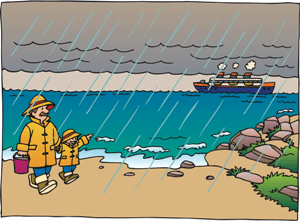English Pronouns
 A
pronoun
is a word that is used instead of a noun.
A
pronoun
is a word that is used instead of a noun.
Click Here for Step-by-Step Rules, Stories and Exercises to Practice All English Tenses
For example, you could say, "Lisa is a nice girl."
Then you could replace the noun "Lisa" with the word "She" and get the following sentence:
"She is a nice girl."
"She" is a pronoun.
Here is another example.
You could say, "I met Joe and Julie at the store."
Then you could replace the noun phrase "Joe and Julie" with the word "them," and get the following sentence:
"I met them at the store."
"Them" is a pronoun.
Here are some more examples:
I, he, it, we, them, us, mine, itself.
Example sentences:
- He doesn't want go with them.
- Would they help us?
- His house is bigger than ours.
- Who is she?
The word "pronoun" comes from "pro" (in the meaning of "substitute") + "noun."
Types of pronouns
Personal PronounsDemonstrative Pronouns
Interrogative Pronouns
Possessive Pronouns
Relative Pronouns
Reflexive Pronouns
Intensive Pronouns
Reciprocal Pronouns
Indefinite Pronouns
and
Pronouns vs. determiners
Pronoun/Antecedent Agreement
Pronoun exercise
Personal Pronouns
Personal pronouns represent people or things. The personal pronouns are: I, you, he, she, it, we, they, me, him, her, us, them.
Vote for me!


There are two kinds of personal pronouns: subjective pronouns and objective pronouns.
Subjective pronouns
Subjective pronouns are pronouns that are used as the subject of a sentence. For example, "He plays the guitar."The subjective pronouns are: I, you, he, she, it, we, they, what, who.
Example sentences:
- We are going home.
- Who is working late?
- What's happening?
Objective pronouns
Objective pronouns are used as an object in a sentence.For example, "Donna told him the truth."
The objective pronouns are: me, him, her, it, us, you, them, whom.
Example sentences:
- I am doing this for you.
- Jack was there before us.
- Whom did you meet last night?
See also: You and I vs You and Me (Subjective and Objective Pronouns)
Possessive Pronouns
"Possessive" means "showing ownership."Possessive pronouns indicate that something belongs to somebody/something.
The possessive pronouns are: mine, yours, his, hers, ours, theirs.
This cat is mine.
Example
sentences:- The prize will be his.
- This place is theirs.
- Is that cat yours?
- They are friends of mine.
- Your roof is stronger than ours.
- My car is slow. Hers is much faster.
Demonstrative Pronouns
"Demonstrative" means "showing, making something clear."Demonstrative pronouns point to things.
The demonstrative pronouns are: this, that, these, those.
- Use "this" and "these" to talk about
things that are near in
space or in time.
- Use "that" and "those" to talk about things that are farther away in space or time.
This
is the report I want.
That
is a big ship.
- This cannot go on.
- That was beautiful!
- He wanted those, but decided to compromise on these.
Interrogative Pronouns
"Interrogative" means "used in questions."Interrogative pronouns are used to ask questions.
The interrogative pronouns are: who, whom, which, what, whose, whoever, whatever, whichever, whomever.
- Use "who" and "whom" to talk about people.
- Use "which" and "what" to talk about animals and things.
Who?

What?


What?

Example sentences:
- Who is your father?
- Whom did you speak to?
- Which bag did you buy?
- What are my options?
Relative Pronouns
"Relative" means "connected with something."Relative pronouns are pronouns that link different parts of a sentence.
The relative pronouns are: who, whom, whose, which, that, what, whatever, whoever, whomever, whichever.
The cake that
I got!


Examples sentences:
- The girl who called yesterday came to see you.
- The teacher whom you wrote has answered your questions.
- My husband, whose friends you've just met, has a birthday party.
- She lives in Kiev, which is the capital city of Ukraine.
- I really liked the book that you gave me.
- The winner, who was very excited, received her prize.
- We can't tell you what you should do.
- She will be happy with whatever you give her.
- Whoever thinks that is wrong.
- You can date whomever you like.
- Whichever dress you pick, you will look great.
Reflexive Pronouns
"Reflexive" means "going back to itself."Reflexive pronouns show that the action affects the person who performs the action. Reflexive pronouns end in "-self" (singular) or "-selves" (plural).
The reflexive pronouns are: myself, yourself, himself, herself, itself, ourselves, themselves.
She hugs herself.


Example sentences:
- He cut himself while shaving.
- I sent myself to bed.
- He could hurt himself!
- We must help ourselves.
- She trusts herself.
Intensive Pronouns
"Intensive" means "giving force or emphasis."An intensive pronoun is a pronoun used for emphasis. In other words, intensive pronouns emphasize the subject of the sentence. They are written exactly the same way as the reflexive pronouns, but their function is different.
I made it myself.


Example sentences:
- I myself baked the cake.
- The queen herself recommended this restaurant.
- Have you yourself been there?
- The project itself wasn't difficult.
- We will do it ourselves.
Reciprocal Pronouns
"Reciprocal"
means that two people or groups do the same thing to each other. They
treat each other in the same way.For example, Joe loves Kate, and Kate loves Joe. So we can say, "Kate and Joe love each other."
Another example is, "Mike helps Lucy, and Lucy helps Mike." So we can say, "Mike and Lucy help each other."
There are two reciprocal pronouns in English:
Each other and one another.
They hug each
other.


Example sentences:
- The cat and the dog like each other.
- The two politicians hate each other.
- We must stop fighting one another.
- They gave each other Christmas presents.
- They can't hear one another.
- In the movie, the good guys and bad guys fight against each other.
- Thomas and his brother finally forgave each other.
Indefinite Pronouns
"Indefinite" means "not exact, not limited."Indefinite pronouns are pronouns that do not refer to any specific person or thing.
Examples:
Anything, everybody, another, each, few, many, none, some, all, any, anybody, anyone, everyone, everything, no one, nobody, nothing, none, other, others, several, somebody, someone, something, most, enough, little, more, both, either, neither, one, much, such.
Every girl is dancing.

- Do you remember anything?
- Everybody wanted to go home.
- That sandwich was delicious. Can I have another?
- When the kids come back, let's give each a small gift.
- Few are aware of this.
- Many have died during the war.
- She is loved by many.
- He got all the pens, and I got none.
- Some may wish to thank you.
- All of us are here, so we can start.
- I can't find any of my socks.
- Has anybody seen Janet?
- You can ask anyone about this.
- Can anyone call her?
- Everyone likes to rest.
- We bought everything we needed.
- No one can look her in the eye.
- Nobody knew what to do.
- There is nothing more to say.
- None of my friends wanted to go home.
- We live on this side of the river, and they live on the other.
- Some people have more luck than others.
- I've read several of his books.
- Somebody is going to put an end to this.
- Can someone help me?
- Something can be done to help.
- There is something strange about this guy.
- Most will choose to ignore him.
- Do you need more water? No, I have enough.
- Little was done regarding this important matter.
- Are you looking for cups? There are more over here.
- More of us are starting to see what's going on.
- Both of you are right.
- I have an apple and a pear – you can have either.
- They had a red car and a white car. Neither was very nice.
- I'm getting myself a bowl of rice. Would you like one, too?
- "So what's new?" "Not much."
- Unfortunately, he was poor and they treated him as such.
Pronouns vs. Determiners
Many words can be used both as pronouns and determiners, so here is the key difference:A pronoun is used instead of a noun.
A determiner comes before a noun.
So for example, when the word "this" is used instead of a noun, it's a pronoun: "This is not funny."
When the word "this" comes before a noun, it's a determiner:
"Can you open this book?"
| Determiner
(the noun is underlined) |
Pronoun (there is no noun since the pronoun replaces it) |
| This is my car. | This car is mine. |
| Your hat is cool. | This hat of yours is cool. |
| I love her cooking. | The cooking is all hers. |
| Mark found his jacket. | A friend of his called. |
| Our room is much smaller. | Your room
is huge. Ours is much smaller. |
| Their meetings are always noisy. | The printer is theirs. |
| This movie is the best. | This is the best movie. |
| I liked that restaurant. | I liked that very much. |
| Some people may find it immoral. | Some may find it immoral. |
| Which color do you like the most? | Which of the books is yours? |
| There are several plates on the kitchen table. | If you need plates, there are several on the kitchen table. |
| He doesn't have much money. | He can't lend you any money. He doesn't have much himself. |
| Most cats like to sleep. | Most of my cats like to sleep. |
| He didn't have any candy. | He didn't have any. |
Pronoun/Antecedent Agreement
An antecedent is a word (or a group of words) which a pronoun refers back to.Examples:
(the antecedent is red and the pronoun is green)
- Beth will buy some water
and drink it.
Water is the antecedent of "it."
"It" is a pronoun and it refers back to "water."
- Diana
left her
book at school.
Diana is the antecedent of "her."
"Her" is a pronoun and it refers back to "Diana."
- Kevin
and
Laura are meeting their
friends.
The phrase Kevin and Laura is the antecedent of "their."
"Their" is a pronoun and it refers back to "Kevin and Laura."
The word "antecedent" comes from the Latin: ante (before) + cedere (to go).
The Importance of Pronouns
Here we can see the great importance of pronouns. If we didn't have
pronouns, these sentence would have to be written like this:- Beth will buy some water
and drink the water.
- Diana
left Diana's
book at school.
- Kevin and Laura are meeting Kevin and Laura's friends.
The Importance of Antecedents
Read the following sentences and see if you can fully understand
them:- They
took it.
(Who took it? What did he or she take?)
- Ours
is with them.
(What is with them? Who is they?)
- She
bought hers.
(Who is she? What did she buy?)
If there are no antecedents it can be unclear what the speaker or writer is referring to.
Important note:
In many cases the antecedent can be fully clear even without directly mentioning it. In other words, the antecedent can be understood from context.
For example, let's say Jessica and Molly have an annoying neighbor. They always complain about him.
Jessica can say to Molly, "Do you know what he did this time?"
It will be fully clear to Molly who Jessica is referring to.
Pronoun/Antecedent Agreement
A pronoun must agree with its antecedent in three ways:- Person
(First person: I/we, second person: you, third person: he/she/it/they)
Correct: Bob did his homework.
Incorrect: Bob did your homework.
- Number (singular/plural)
Correct: Bob did his homework.
Incorrect: Bob did their homework.
- Gender (masculine/feminine)
Correct: Bob did his homework.
Incorrect: Bob did her homework.
Important note:
In some cases such sentences can be correct. You simply have to use your common sense.
For example, let's say that Bob did Susan's homework, and I am now talking to Susan.
In this case, I can definitely say, "Bob did your homework."
(And I am referring to Susan's homework, not to Bob's homework. So in this case the antecedent is Susan, not Bob!)
Determining the correct pronoun to use is usually pretty straightforward.
Some cases, however, can seem more challenging.
So here are some more correct and incorrect examples:
Correct: Every boy will start his test.Incorrect: Every boy will start their test.
Correct: The box of toys is in its place.
Incorrect: The box of toys is in their place.
Correct: Both lost their jobs.
Incorrect: Both lost his jobs.
Correct: Alice and Kate talked with their father.
Incorrect: Alice and Kate talked with her father.
Correct: The United States opened its borders.
Incorrect: The United States opened their borders.
See also: How to Use Relative Clauses (Who, Which, That, Whose, Where, When)
Pronoun exercise
Illustrated Worksheet on English
Pronouns
Get Updates, Special Offers, and English Resources
Download your FREE GIFT (the first two chapters of
English Short Stories Book and Workbook)
as soon as you join!

By submitting your email, you consent to receiving updates and newsletters from us and to the sharing of your personal data with third parties for the purposes of sending you communications. We will not spam you. You can unsubscribe at any time. For more information, please see our privacy policy.
Return from English Pronouns to English Parts of Speech
Return from English Pronouns to Learn to Write in English








